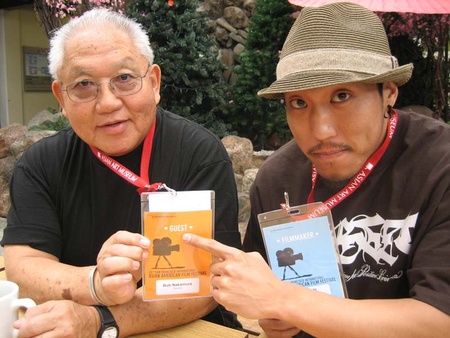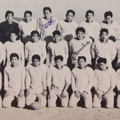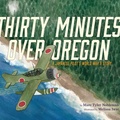>> Part 1
Nakamura is a Yonsei with a passion for music, sports, and storytelling. At 30 years old, he has already created a trilogy of documentaries on the Asian American Movement that comprises Yellow Brotherhood (2003), Pilgrimage (2007), and A Song for Ourselves (2009). His current project is a film about rising ukulele superstar Jake Shimabukuro.
The son of renowned filmmakers Robert Nakamura and Karen Ishizuka, Nakamura grew up in Culver City where he attended the Senshin Buddhist Temple, played Japanese American basketball, and participated in the Boy Scouts with a group that gathered at the Venice Buddhist Temple. Meanwhile, he played football and ran track at school, where he says he was usually one of only one or two Asian American kids in the whole league. “I think I sort of got the best of both worlds,” he says.
Despite having two filmmakers for parents, Nakamura never felt pressured to go into the arts, gravitating towards sports instead. As an Asian American Studies major at UCLA, he ended up taking the EthnoCommunications course then co-taught by his father and John Esaki. “Initially I just took the class to get an easy A,” he jokes. “I never had any intention of making films.”
But when Esaki helped him make his first film, Nakamura realized he had found his craft. “Before I took the EthnoCommunications course,” he says, “I was really involved with the student activism on UCLA’s campus… I realized that I wanted to spend most of my time and energy fighting for social justice and also community building amongst Asian Americans.
“I was trying to figure out which avenue I could do that best in and then after taking the EthnoCommunications course, all of a sudden I had this skill that I could use to do my activism and organizing.”
While still at UCLA, Nakamura began work on the film that was to be the first of his trilogy, Yellow Brotherhood. “Initially,” he admits, “I was in college and kinda missing my high school friends and my community there, so I basically just wanted to do a film on my friends… it kind of started from there.
“Once I started learning about the Asian American Movement, it was one of those things where the more you find out, the more you realize how much you don’t know… I started learning about all these different stories and just realizing that, one, these are really important stories that, you know, have impacted all of us, but also, two, they’ve really never been told or documented.”
From there, one story led to another. Three documentaries later, all of Nakamura’s works share a similar feel, incorporating history and love of community with a musical, poetic sensibility.
The Jake Shimabukuro project is a new experience for the filmmaker, being his first “hired gig” (conceptualized by the Center for Asian American Media in San Francisco) and an undertaking on a much larger scale than his earlier works. The film is also a departure from the theme of social activism. Though the social issues involved in Shimabukuro’s story are “not as blatant” as they are in Pilgrimage or the rest of his repertoire, Nakamura still sees interesting social and cultural dynamics there.
“Being Japanese American, it’s interesting that [Shimabukuro] is huge in Japan,” he says. “He’s probably the biggest by far in Japan and that’s interesting, you know, the fact that Hawaiian music is very big in Japan and yet it kinda took this Japanese American kid playing this Hawaiian instrument for them to really gravitate towards it.”
His ability to unearth the underlying issues below the surface of a story is a quality that lends immediate appeal to Nakamura and his work. Similarly, despite his position as an activist in the Japanese American and Asian American communities, Nakamura takes a broad view of what it means to be socially active in one’s own community.
“A lot of people ask, ‘Well, what are some Japanese American issues today?’ and I think, you know, health care is a Japanese American issue, education, budget cuts, are Japanese American issues, and… the right to marry… these are all Japanese American issues because they affect Japanese Americans.
“I think because [Asian Americans] are not included in the mainstream dialogue, a lot of people don’t make a connection. But within the community we can say, hey look, this is exactly where we were only thirty, forty years ago, you personally experienced it and we should really stand up for people who are being discriminated against now… Even though we’re Asian American and we have connections to specific issues, that doesn’t mean that we just have to stay with that.”
In other words, policies that seem not to affect us directly do have an impact on our lives and at the same time, our actions have the potential to help others in their struggles, bringing to mind the adage, “No one is free when others are oppressed.” The more light people like Nakamura can shed on the past, the more obvious these connections will become, hopefully encouraging people across communities to adopt a more empathetic perspective.
For his part, Nakamura hopes to continue working within a community context. When people ask if he aspires to make fiction films, he says he really sees himself more a documentarian or even as a teacher, training young filmmakers to tell their own communities’ stories.
“I think too, being just one filmmaker, there’s so many stories that need to be told and I feel for sure that I can’t cover all the stories I’d like to,” he says, taking a pause. “And also, I feel I’m not the person to tell certain stories… I really do think that a story is told best when it’s coming from within the community or when it’s told by people who’ve experienced it themselves.”
© 2011 Mia Nakaji Monnier






